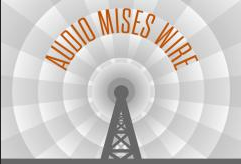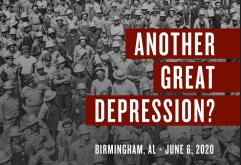It is a common belief that sound economics must be based on facts and not on theoretical reasoning as such. Some commentators are dismissive of economic analysis that is not derived from the true data, since it is not describing the facts of reality as depicted by historical data. The use of the free market economy framework, without the central bank and government intervention and with businesses as a foundation to derive valid conclusions, is dismissed as nonsensical. After all, we don’t have a free market economy without a central bank and without government intervention. In order to be practical, it is held, economists should stick to the facts. Can the State of an Economy Be Established Using Historical Data? For most so-called practical economists,
Topics:
Frank Shostak considers the following as important: 6b) Mises.org, Featured, Ludwig von Mises, newsletter
This could be interesting, too:
Nachrichten Ticker - www.finanzen.ch writes Die Performance der Kryptowährungen in KW 9: Das hat sich bei Bitcoin, Ether & Co. getan
Nachrichten Ticker - www.finanzen.ch writes Wer verbirgt sich hinter der Ethereum-Technologie?
Martin Hartmann writes Eine Analyse nach den Lehren von Milton Friedman
Marc Chandler writes March 2025 Monthly
 It is a common belief that sound economics must be based on facts and not on theoretical reasoning as such. Some commentators are dismissive of economic analysis that is not derived from the true data, since it is not describing the facts of reality as depicted by historical data. The use of the free market economy framework, without the central bank and government intervention and with businesses as a foundation to derive valid conclusions, is dismissed as nonsensical. After all, we don’t have a free market economy without a central bank and without government intervention. In order to be practical, it is held, economists should stick to the facts.
It is a common belief that sound economics must be based on facts and not on theoretical reasoning as such. Some commentators are dismissive of economic analysis that is not derived from the true data, since it is not describing the facts of reality as depicted by historical data. The use of the free market economy framework, without the central bank and government intervention and with businesses as a foundation to derive valid conclusions, is dismissed as nonsensical. After all, we don’t have a free market economy without a central bank and without government intervention. In order to be practical, it is held, economists should stick to the facts.
Can the State of an Economy Be Established Using Historical Data?
For most so-called practical economists, information regarding the state of an economy is derived from the data. Thus if an economic statistic such as real gross domestic product or industrial production displays a visible increase, this is labeled as indicative of a strengthening of the economy. Conversely, a decline in the growth rate is regarded as a weakening of the economy. It seems that by looking at the data one can ascertain economic conditions, but in fact the so-called data that analysts look at is a display of historical information.
According to Ludwig von Mises in Human Action:
History cannot teach us any general rule, principle, or law. There is no means to abstract from a historical experience a posteriori any theories or theorems concerning human conduct and policies. (pp. 41–49)
Also, in the The Ultimate Foundation of Economic Science, Mises argued that
What we can “observe” is always only complex phenomena. What economic history, observation, or experience can tell us is facts like these: Over a definite period of the past the miner John in the coal mines of the X company in the village of Y earned p dollars for a working day of n hours. There is no way that would lead from the assemblage of such and similar data to any theory concerning the factors determining the height of wage rates. (p. 74)
Furthermore,
The historian does not simply let the events speak for themselves. He arranges them from the aspect of the ideas underlying the formation of the general notions he uses in their presentation. He does not report facts as they happened, but only relevant facts. (Human Action, p. 47)
Hence, to make sense of the data thereneeds to be a theory that will guide the analyst in interpreting it.
The Importance of Definitions
The key to the analysis of data is to establish the subject of investigation. The next step is to define that subject. The purpose of the definition is to ascertain the key factors that determine the subject of the investigation.
To establish a definition, it is helpful to go back as far as one can to the point in time when a particular thing emerged. For instance, when analyzing money supply we would go back to the point when a particular commodity started to assume the role of money. In the case of money, one would establish that people started to use money in order to promote the trade of goods for goods.
Selecting a commodity as money enabled the most efficient exchange. By establishing that money is the medium of exchange we have also established that individuals are paying for one good in terms of other goods with the help of money. Without establishing the definition of money, it is not possible to say anything meaningful about it and its role in human affairs.
So when an analyst raises an alarm on account of a strong increase in money supply, what triggers this alarm is not just the increase, but the knowledge that the price of a good is the amount of money per unit of that good. By observing an increase in money supply, one can infer that, all other things being equal, more money will be spent per good, i.e., the prices of goods are going to increase.
The definition of money as the medium of exchange enables us to establish that once it is injected there are always early and late recipients of money. We can also establish that once it is injected individuals employ money to exchange for goods and services with other individuals.
This enables us to ascertain that there will be a time lag before the unit of money reaches subsequent individuals, and so on. This in turn enables us to infer that because of the time lag and the fact that a good’s price is the amount of money per good, a change in the money supply is likely to have a lagged effect on various markets in terms of the prices of goods in these markets.
Thus, according to Mises in Human Action:
The data of history would be nothing but a clumsy accumulation of disconnected occurrences, a heap of confusion, if they could not be clarified, arranged, and interpreted by systematic praxeological knowledge. (p. 41)
We can also conclude that without a theoretical framework the data cannot tell us the conditions of the economy. It cannot tell us whether the strong GDP data is on account of wealth expansion or on account of the erosion of the wealth generation process. But once we have ascertained that central banks’ loose monetary policies are behind the so-called strong economic conditions, then, by means of a theory, we can establish that this will to weaken the wealth generation process by creating an exchange of nothing for something. We could then conclude that loose monetary policy would be bad news for individuals’ well-being in the months ahead.
Does It Make Sense to Employ a Free Market Framework to Assess a Hampered Economy?
By means of a free market framework one can ascertain the problematic issues of the so-called real world. For instance, one can ascertain the damage that government lockdown policies to counter the coronavirus have caused individual lives.
In a proper free market economy with a total separation of the economy and the state, every company would be on its own. Every company would have to figure out how to survive the damage caused by the coronavirus. In a free market environment, various businesses would most likely have savings for difficult times or insurance for major shocks.
Furthermore, the free market environment is always subject to various shocks, both positive or negative. For instance, the implementation of new ideas and the introduction of new products is likely to be a shock to businesses that were too slow to adapt to these changes. The introduction of electricity was a shock to manufacturers of candles and gaslights. To survive they had to adjust to the new environment.
Likewise, the coronavirus shock has altered the environment in which most businesses were operating. In a free market, businesses would have to adjust to the new arena. They would have to figure out how to coexist with the virus, and various firms would emerge to counter its damaging effects on individual lives. It is highly unlikely that businesses would practice passivity by introducing lockdowns. On the contrary, they would confront the new environment and would try to make the best of it—they would need to in order to survive.
In an unfree market economy, which is hampered by government and central bank interference, businesses are not allowed to effectively counter the side effects of the coronavirus. The lockdowns are in fact paralyzing businesses and preventing the emergence of an effective way to counter the virus’s side effects.
What further aggravates the damage inflicted by the lockdowns is central banks’ massive monetary pumping to prevent the bankruptcy of various companies. Should the government and the central bank provide support to various companies?
Many people are sympathetic to the idea that the government and the central bank should provide support businesses in order to keep them alive. However, neither the government nor the central bank are real wealth generating entities. Consequently, they are not in a position to provide any help. All they can do is take from one individual to give to another. By what criteria will the government decide how much to take from A in order to give to B?
Likewise, when the central bank embarks on aggressive monetary pumping to reduce various businesses’ liquidity difficulties, this sets in motion the transfer of real savings from wealth generators to the holders of the newly injected money. This undermines the process of real wealth generation and subsequently weakens the foundations of the economy. Additionally, the government and the central bank’s interference prevents businesses’ adjustment the new environment created by the coronavirus.
All these conclusions were derived by employing the free market framework.
Tags: Featured,Ludwig von Mises,newsletter








